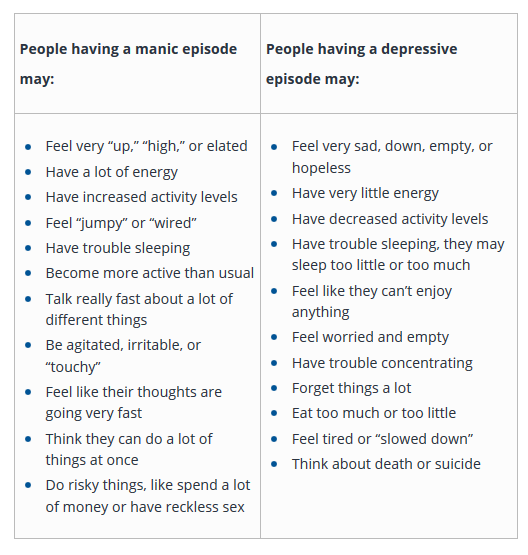March 21, 2019 - March 30th has been declared World Bipolar Day to bring attention and awareness to the disorder, which affects nearly 2.6% of the US adult population and 1-2% of the World population. Bipolar disorder is often characterized by significant shifts in one’s mood, energy and ability to think clearly. The mood shifts experienced by those with bipolar disorder tend to be extreme, intense and lifelong. These shifts, often known as mania and depression, are much more extreme than the ups and downs experienced by those without the disorder and can significantly impact every area of one’s life.
Because those living with bipolar disorder experience their own unique symptoms the illness can be difficult to diagnose. Additionally, bipolar disorder is often accompanied by other mental health and physical health conditions including anxiety, ADHD, substance use, thyroid disease, diabetes, and heart disease.
There are four types of bipolar disorder: Bipolar I, Bipolar II, Cyclothymic, and Specified/Unspecified Bipolar. Bipolar I is characterized by one or more manic episodes lasting for at least a week and often requiring hospitalization to treat. Bipolar II is characterized by more depressive episodes combined with at least one hypomanic episode. Those diagnosed with cyclothymic disorder tend to experience a number of hypomanic and depressive symptoms that last for at least 1 year in adolescents and 2 years in adults. Other specified or unspecified bipolar disorder recognizes symptoms of bipolar disorder that do not fit into the definitions of bipolar I, II, or cyclothymic disorder.
Many celebrities living with bipolar disorder are bringing awareness to the illness. Carrie Fisher, Mariah Carey, Jean-Claude Van Damme, and Mel Gibson have all reported to being diagnosed with bipolar disorder. Perhaps the most vocal, however, is Demi Lovato, who has made mental health advocacy a passion of hers. She does not hesitate to talk about her diagnosis and uses her celebrity platform to work toward minimizing the stigma attached to mental illness. Recently, Demi Lovato helped educate others on the danger of labels declaring that she is not bipolar, but rather has bipolar disorder highlighting that illness is something we have, not something we are.
Learn more about bipolar disorder by reading the articles that supported this blog…Mental Health America's article: 7 Reasons Why World Bipolar Day Is Important, NAMI's site about bipolar disorder, and the National Institute of Mental Health’s page about bipolar disorder. Asking someone you know that lives with bipolar disorder to talk about their experiences is another great way to learn more, while showing that you care. The more we talk about mental health, the more it is understood and appreciated.
The National Institute of Mental Health provides some examples of the symptoms experienced in a manic or depressive episode:

